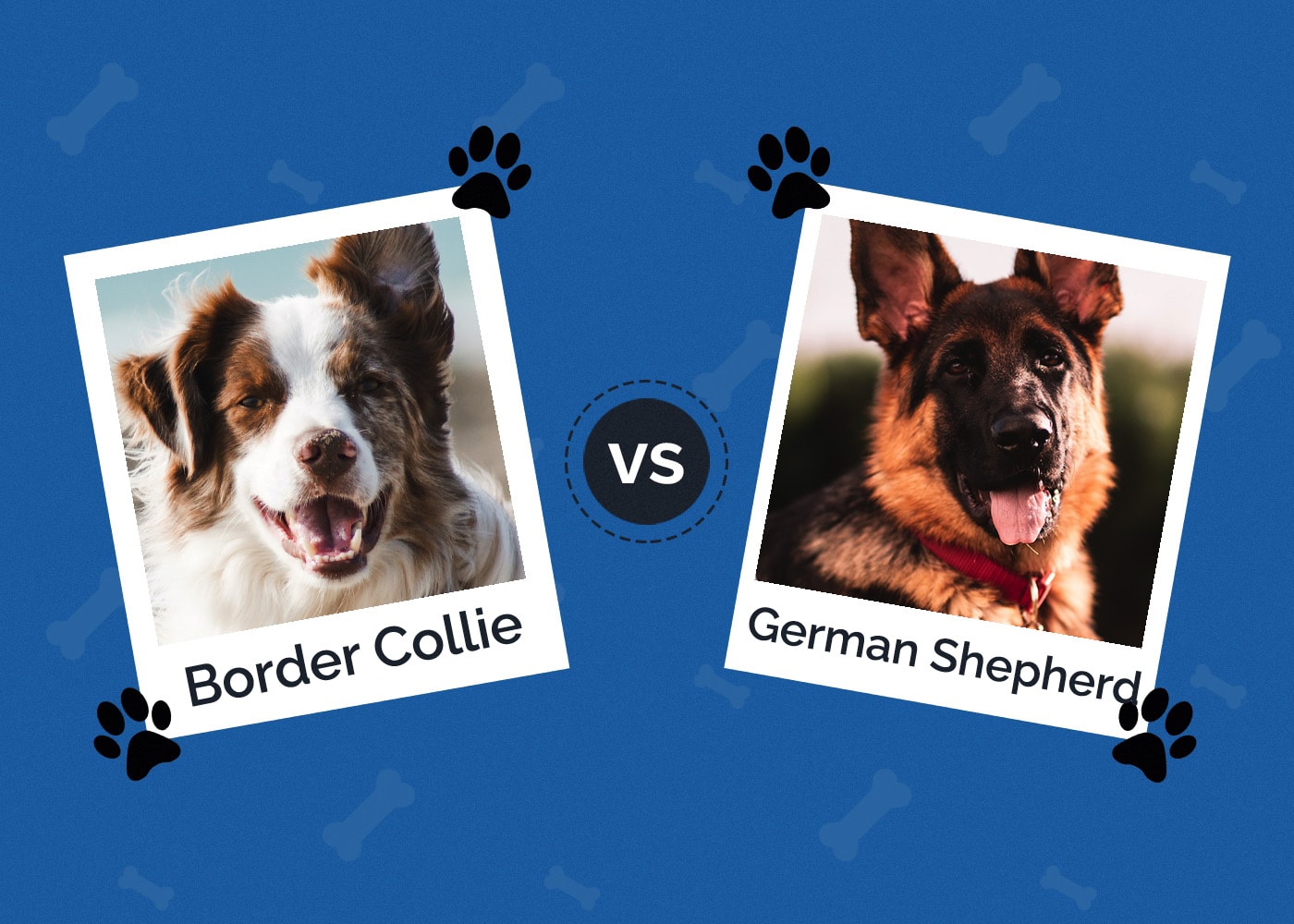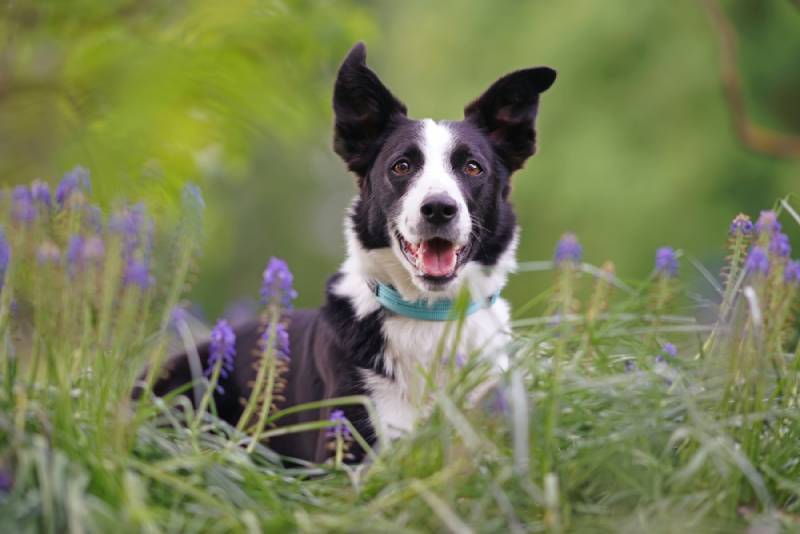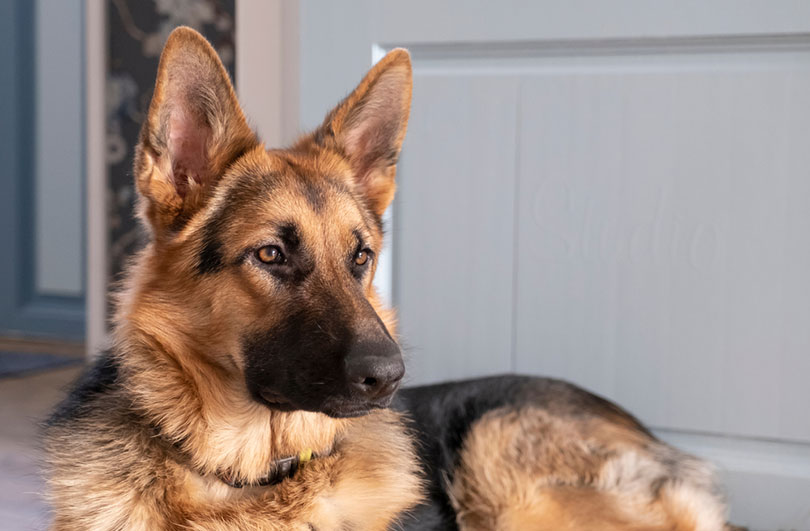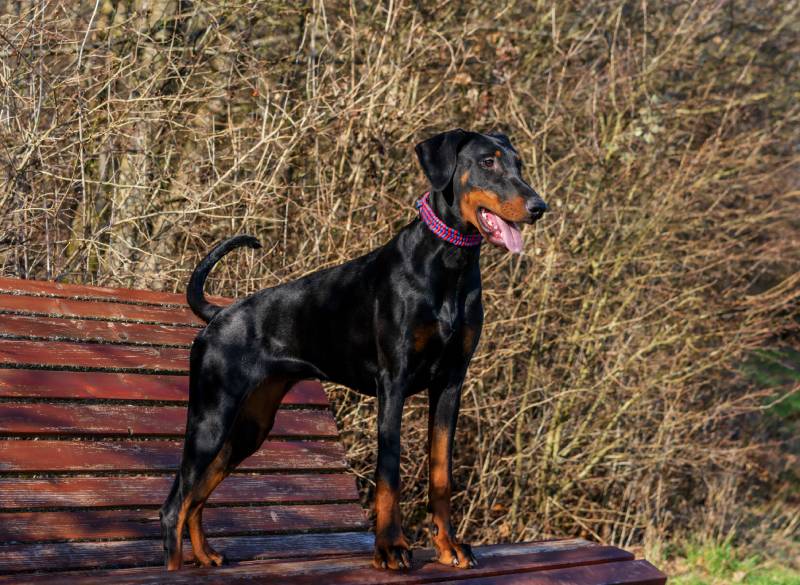Border Collie vs German Shepherd: Which One Is Right for Me? (With Pictures)
By Kit Copson
Updated on

If you have to choose between a Border Collie and a German Shepherd, you have a real dilemma on your hands as both breeds are wonderful—hardworking, family-oriented, and devoted. They’re also both pretty high-maintenance dogs in terms of their energy levels and tend to thrive under the guidance of a capable, consistent, and patient pack leader.
On the other hand, there are a few differences, and having a good knowledge of these differences may make it easier for you to decide whether the Border Collie or German Shepherd could be your future (fluffy) soul mate.
That said, every dog is unique in terms of temperament and needs, so we recommend getting to know as much as possible about an individual dog before you make your decision, regardless of the breed. Let’s investigate the general similarities and differences between the Border Collie and the German Shepherd.
Visual Differences

At a Glance
- Average height (adult): 18–22 inches
- Average weight (adult): 30–55 pounds
- Lifespan: 12–15 years
- Exercise: 2 hours per day
- Grooming needs: Moderate
- Family-friendly: Yes, with socialization, but tends to do better with older children
- Other pet-friendly: Yes, with socialization
- Trainability: Highly intelligent and energetic, learns easily and enjoys training sessions but requires a capable, ideally experienced leader
- Average height (adult): 22–26 inches
- Average weight (adult): 50–60 pounds
- Lifespan: 7–10 years
- Exercise: 2 hours per day
- Grooming needs: Moderate
- Family-friendly: Yes, with socialization
- Other pet-friendly: Yes, with socialization
- Trainability: Very smart and eager to please, needs plenty of consistency and positive reinforcement
Border Collie Overview

Border Collies have a long history that dates back to the Roman period. They were developed from Spitz dogs and Roman dogs and were bred for farm and herding work.
Personality
One thing’s for sure—Border Collies are not for the faint of heart! These whipsmart, high-energy dogs often take part in and excel in agility and trial events—anything where they get to show their intelligence and speed. These traits come from their history as herding dogs, as for thousands of years, these dogs have adapted to tasks requiring brain work and agility.
Border Collies are very much “go go go!” kinds of dogs that thrive on a challenge and spending time in the great outdoors. You can focus some of their energy and boost their confidence by giving them little jobs to do like getting them to find or carry something, as Border Collies love having a sense of responsibility.
As family members, Border Collies are typically very affectionate, playful dogs, though they may be a bit aloof around strangers.
Training
Border Collies love nothing more than being kept busy and doing activities that require them to use their sharp brains. For this reason, they respond well to training, especially learning commands and tricks.
It’s important that Border Collies are socialized and trained early because their high energy means that if they aren’t given clear boundaries, they can become difficult to rein in later on as adults.
They need to meet and have positive experiences with other people and dogs, and obedience classes can really help with this while helping you and your Border Collie learn important skills that will help them become well-adjusted, responsive adults. Border Collies pair well with people who have some experience training and socializing dogs.
Health & Care
Border Collies have a long expected lifespan of between 12 and 15 years, and making sure your Collie gets a quality diet and plenty of exercise helps contribute to their overall quality of life. If you buy a Border Collie, be sure to do so only from a responsible breeder who screens for health conditions. These are some of the health conditions Border Collies are prone to:
- Epilepsy
- Hip dysplasia
- Collie eye anomaly
- Imerslun-Gräsbeck syndrome
- Ceroid lipofuscinosis
In terms of coat care, Border Collies should be brushed at least once a week with a pin brush, though when they’re shedding more heavily in spring and fall, you’ll likely need to do this every day.
Check their nails regularly to make sure they aren’t getting overgrown, and have a look inside the ears to check for dirt, debris, or signs of infection. Frequent teeth cleaning at home can help enhance tooth and gum health.

Suitable For:
Border Collies thrive in active families who are happy to indulge them in around 2 hours of exercise per day, which can be achieved with walks (especially in locations where your Border Collie can safely run and explore freely, like dog parks), agility activities, and games like fetch and hide-and-seek. Interactive toys like obstacle feeders are also great for this clever pooch.
They also tend to fit well into families with older children, because the Border Collie’s tireless energy can make things a bit more challenging. A well-socialized Border Collie will not be aggressive with small children. Still, it’s always a good idea to supervise, especially as this breed can be incredibly bouncy and a tad boisterous.
- Affectionate with family
- Playful and fun-loving
- Eager to please
- Responds well to training
- Great for active families
- Sheds heavily during spring and fall
- Requires a lot of exercise
- The high energy can be a challenge
German Shepherd Overview

The majestic German Shepherd has roots in 19th-century Germany, where these dogs were bred to herd and to keep a watchful eye out for potential predators or thieves. Today, they’re commonly put to work in police forces and the military.
Personality
German Shepherds are highly intelligent, brave, and focused dogs that take any job they’re given seriously. Like the Border Collie, they’re famous for their quick brains, strong work ethic, and their need to be kept busy, but, at the same time, a well-trained and socialized German Shepherd has an air of dignity and calm that matches perfectly with their confident and proud stance.
They’re also wonderful family dogs due to their loving temperaments and fierce loyalty, but they aren’t known for being particularly friendly with strangers.
Like any dog breed, as long as a German Shepherd has been properly socialized, unprovoked aggression won’t be an issue, but they’re not always the kinds of dogs to happily bound over to everyone in the park or take each and every opportunity to befriend a stranger. This depends, though—every dog is different.
Training
The smart and capable German Shepherd doesn’t have much difficulty with obedience training, which is why they’re so commonly used as service dogs. They’re very confident and hardworking dogs and will always give their best effort.
German Shepherds respond best to owners who are patient, consistent, and generous with that positive reinforcement. For all dogs, no matter the breed or size, early obedience training and socialization are extremely important, but even more so with large, powerful dogs like the German Shepherd, so consider getting yours enrolled in classes.
Health & Care
The German Shepherd’s average lifespan is between 7 and 10 years, which isn’t very long compared to other breeds like the Border Collie, Jack Russell, Yorkshire Terrier, and Australian Shepherd.
You can contribute to keeping your German Shepherd healthy with an appropriate, high-quality diet, regular ear checks, and nail trimming. It’s also a good idea to brush their teeth frequently and brush them every few days—daily during shedding seasons. Health conditions to watch out for in German Shepherds include:
- Bloat
- Hip and elbow dysplasia
- Eye conditions
- Epilepsy
- Canine Degenerative Myelopathy

Suitable For:
German Shepherds do best with a patient and consistent owner who is committed to training and socializing them from an early age, and who will provide enough mental and physical exercise on a daily basis.
The AKC has ranked the German Shepherd 5/5 on its “good with young children” scale, but it’s important to socialize your German Shepherd around children and always supervise, as with any dog breed.
- Affectionate with family
- Loyal and protective
- Quick to learn
- Confident
- Enjoys a variety of activities
- Sheds heavily during spring and fall
- Can be wary of strangers (though this can also be a pro!)
- Requires a lot of exercise
Which Breed Is Right for You?
To summarize, the Border Collie is a medium-sized dog with tireless energy and very high intelligence. They’re often quite happy-go-lucky and affectionate with family, though a tad aloof with strangers.
Likewise, the German Shepherd has loads of energy, high exercise needs, and is very family-oriented. They’re often proud and dignified as well as fiercely loyal and can be wary of strangers.
Both breeds are very trainable and are wonderful family dogs with socialization, but if you’re looking for a medium-sized, active, and bouncy dog that you can take on all your adventures, the Border Collie might be the best canine partner for you.
If you’re leaning more towards a larger dog with confidence and an air of unshakeable dignity, you might prefer a German Shepherd. Whichever breed you choose, it’s best to choose based on the dog’s individual character rather than generalizations about the breed.
See also:
- Collie vs Border Collie: Notable Similarities & Differences
- Types of German Shepherds: Pictures, Facts & History
Featured Image Credit: (L) Pauline Loroy, Unsplash | (R) Alexander Naglestad, Unsplash














